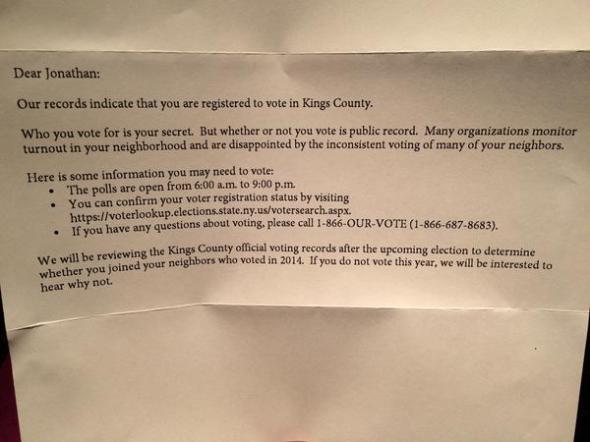redo Jump to...
print Print...

A user posted a photo of his vote-or-else letter on twitter.
(by Carl Campanile and Natalie O’Neill, NY Post) – The New York State Democratic Committee [sent] letters [to Democrat voters] warning that it can easily find out [who] failed [to vote on election day].
“Who you vote for is your secret. But whether or not you vote is public record,” the letter says.
“We will be reviewing voting records…to determine whether you joined your neighbors who voted in 2014.”
It ends with a line better suited to a mob movie than a major political party: “If you do not vote this year, we will be interested to hear why not.”
The letter and accompanying post card was criticized even by party members, with one Democratic consultant saying it was the wrong way to inspire votes. “It’s a threatening letter. It’s a scare piece that is unnecessary and inappropriate,” the insider said.
Brooklyn and Manhattan residents who received the note Wednesday were furious, calling it an attempt to browbeat them into showing up at the polls.
“I’m outraged. Whether I vote or not is none of your business!” said a Manhattan voter, who was so incensed that she complained to a local Democratic leader.
“The letter is ludicrous and menacing,” said the voter, who requested anonymity.
The woman also received a report card of her voting record, pointing out that she had failed to vote in two of the last four elections.
Overall, the notices were sent out to 1 million registered Democrats who had failed to vote in previous midterm elections, according to the group.
The committee – chaired by former Gov. David Paterson – defended the scare tactic, calling it standard practice throughout the country. …
Paterson declined to comment.
The mailer has a phone number on it that goes to Election Protection, a nonpartisan voting organization.
The organization said it had received a “significant” number of calls about the letter.
Such attempts to shame people to vote – what politicos call “social pressure” or peer pressure – has become more common place and was used by the Obama campaign in 2012, sources said.
A Yale University study in 2008 found that voter participation increased substantially after lazy voters received letters telling them their spotty voting history was a public record that would be scrutinized.
The notice includes a “vote report card” rating New Yorkers’ voting records as “excellent,” “good,” “fair” or “incomplete.”
“Many organizations monitor turnout in your neighborhood and are disappointed by the inconsistent voting of many of your neighbors,” it says.
The letter came a week before heavily favored Democratic Gov. Cuomo faces off against Republican Rob Astorino.
Cuomo was not behind the shame letters, party sources insisted.
But gubernatorial challenger Astorino scoffed, “Andrew Cuomo’s thuggish tactics just crossed the line into creepy territory . . . Threatening and intimidating people is not how honorable elected leaders operate.”
Reprinted here for educational purposes only. May not be reproduced on other websites without permission from the New York Post.
Questions
1. The first paragraph of a news article should answer the questions who, what, where and when. List the who, what, where and when of this news item. (NOTE: The remainder of a news article provides details on the why and/or how.)
2. How will the NY State Democratic Committee know whether New York Democrats voted in this election?
3. a) What did the NY State Democratic Committee letter to voters actually say?
b) Which registered Democrats did the Committee sent the letters to? What was also mailed to these voters along with the letter?
4. How are Democratic consultants and voters reacting to the letter?
5. How did the New York State Democratic Committee defend the letter?
6. From paragraph 15-16: “Such attempts to shame people to vote – what politicos call ‘social pressure’ or peer pressure – has become more common place and was used by the Obama campaign in 2012, sources said. A Yale University study in 2008 found that voter participation increased substantially after lazy voters received letters telling them their spotty voting history was a public record that would be scrutinized.”
a) Would receiving this type of letter move you to vote? Explain your answer.
b) Did you know your voting record can be accessed online? (It is public record.)
c) Do you think individual voting records (when and whether or not you vote) should be public record? Why or why not?
d) Ask a parent if he/she supports the New York Democratic Committee’s letter and voter record card sent to registered voters who did not vote.
e) Discuss all of your answers to question #6 with a parent.
CHALLENGE: The Democratic Party presents itself as being the party that does more for immigrants. What type of effect do you think this letter would have on an immigrant who has just become a citizen and/or who comes from a country where the people are not free?
Daily “Answers” emails are provided for Daily News Articles, Tuesday’s World Events and Friday’s News Quiz.



